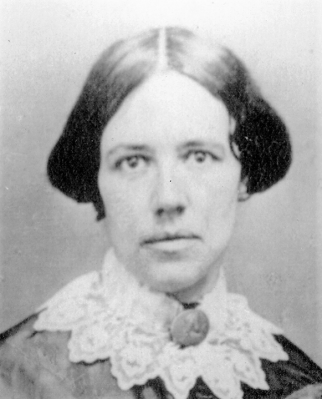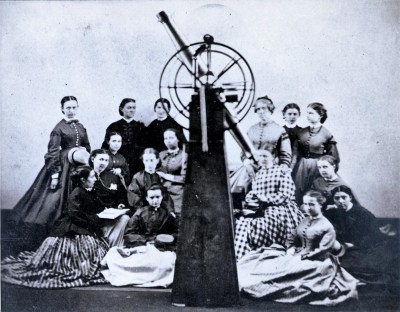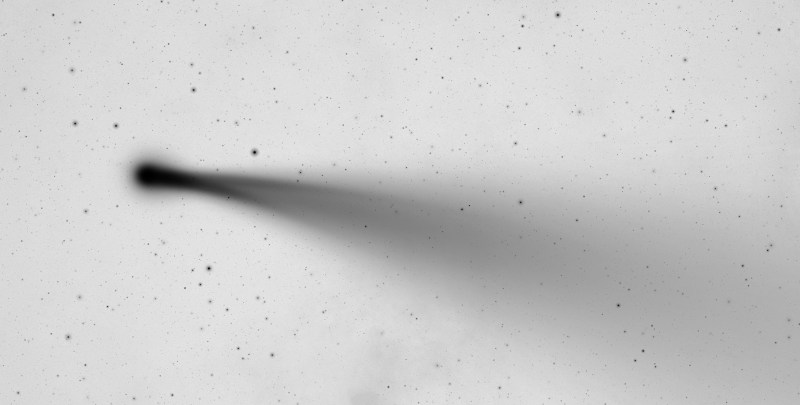On an October night in 1847, a telescope on the roof of the Pacific National Bank building on Nantucket Island was trained onto the deep black sky. At the eyepiece was an accomplished amateur astronomer on the verge of a major discovery — a new comet, one not recorded in any almanac. The comet, which we today know by the dry designator C/1847 T1, is more popularly known as “Miss Mitchell’s Comet,” named after its discoverer, a 29-year old woman named Maria Mitchell. The discovery of the comet would, after a fashion, secure her reputation as a scholar and a scientist, but it was hardly her first success, and it wouldn’t be her last by a long shot.

To say that Maria Mitchell’s life did not follow the typical path of a 19th-century woman’s life is something of an understatement. Nantucket Island was still decades away from the brief burst of prosperity it would find in the rise of the whaling trade when Maria — she pronounced her name with a long “I” sound — was born in 1818. Her parents were Quakers and much involved in Maria’s education, at a time when girls were not necessarily afforded the same opportunities as boys.
It was Maria’s father who would turn her eyes to the skies and serve as her mentor. William Mitchell was an educator, being principal of Maria’s grammar school and later starting his own school. He also had a keen interest in surveying and, suitably enough for life on a seafaring island, navigation and astronomy. William taught Maria how to use navigation instruments, with which she made observations and calculations. By the time she was 14, Maria’s navigational calculations were in demand by the island’s sailors as they set out on their journeys.
At the end of her formal education in 1836, Maria became the librarian of the brand new Nantucket Atheneum. A mix of library and museum, the Atheneum was to be a cultural and intellectual institution, and Maria would remain there for twenty years. With her father, she continued her studies of the heavens, with bigger and better instruments.
Miss Mitchell’s Comet
Maria’s comet discovery in 1847 was not without controversy. In 1832, Danish king Frederick VI established a gold medal prize for anyone who discovered a comet using a telescope. Maria was not alone in observing the comet that would bear her name. On October 3, 1847, Italian astronomer and Jesuit priest Francesco de Vico observed the same comet, quickly wrote up his findings, and posted them to the award committee. Being closer, news of the discovery reached Denmark sooner, and de Vico was awarded the medal. However, Maria had made her observations on October 1, and when the news eventually reached Europe, the prize was awarded to her.
“Miss Mitchell’s Comet” earned Maria a degree of international fame, and while she hated the attention, it provided her with opportunities. After resigning from the Atheneum, Maria traveled around the world, making observations at the Vatican Observatory and conducting several expeditions to study eclipses. As Maria’s reputation grew, she began to accumulate honors — in 1848, she was the first woman to be elected to the American Academy of Arts and Sciences, and two years later to the American Association for the Advancement of Science.
Founder and Pioneer

In 1865, Maria, who never married, moved to Poughkeepsie, New York to the campus of the newly founded Vassar College, the first degree-granting college for women in the United States. Maria would become the first faculty member hired, and along with her widowed father, she lived in the observatory that was built to her specifications to house the second largest telescope in the country at the time.
Her students were expected to do original research in the observatory and in the field, a novelty at the time for students at men’s colleges and unheard of for women students. She traveled with her students to Iowa in 1869 to observe a total solar eclipse, and again to 1878 for another eclipse in Colorado. Such trips were difficult and dangerous in those days, and the sight of a group of women lugging scientific instruments into a frontier town in the midst of a gold rush must have been something to see.
Maria continued teaching and making observations right up until she retired in 1888 due to poor health; she would die a year later at the age of 70. Her contributions to astronomy are many; along with her comet discovery and her eclipse observations, she and her students built an apparatus for making solar photographs and made important observations about sunspots. But perhaps her most important contribution was as an educator and a mentor to her students, just as her father mentored her.
















As an astronomy fanboy, I enjoyed this article.
me too.
It would be interesting to see who among her students went on to make notable contributions to science. I suspect that it would be a fairly long list.
You are correct. You’re also a complete asshole.
Our goal with these ‘lady posts’ is to eventually drive assholes like you off the site. Surprisingly — to you, I guess — women are completely capable of being competent in S.T.E.M. (no A!) fields. If you don’t like it, get the fuck out.
If Dave is right, then the asshole part is simply a label put on him by people who don’t like to hear the truth.
I wonder how noteworthy her accomplishments would be if she were a man? Sometimes I get the strong feeling that many news pieces about women are manufactured because of political bias rather than meritocracy.
I’ve had these “woman do something” stories shoved at me my entire life. They’re grating, and I think they’re insulting to woman as well. My grandmother was the first woman engineer graduating in my country of origin, and she wouldn’t have cared to have a story written about her just because she graduated like any man did. It’s the accomplishments that matter, not the individuals.
I don’t care about the identity or what group a person belongs to when they do something amazing. Nor should anyone, unless they have an agenda to push. I don’t think identity politics need to be shoved down the throats of this diverse readership. This is a website about hacks, I vote we keep it as such.
I think Brian Benchoff’s assumption that Dave doesn’t think women aren’t capable is false, and a knee jerk reaction. I think the vast majority of people here take that completely for granted, Dave included. The problem is fishing for mediocre female accomplishments as part of a political agenda. This serves nobody, men or women. It only serves to divide the genders and infantalize women.
Got it. Being the first woman professor of astronomy isn’t impressive. Says the guy in his basement.
You and Dave are useless to us. We don’t want you as an audience. Please go away.
Brian, why so aggressive? I take that you are a intelligent guy, why can’t you see what Dave and kramboz are saying, it isn’t that they feel that women are inferior to men. It’s that writing about some person only because they are of such gender, race, nationality or sexual orientation is in my opinion demeaning.
And that comment “Says the guy in a basement”, I genuinely feel that you went to far, and ironically hackers were those guys in a basement, those who used their skills, intelligence and time to tinker with things.
I sincerely hope that you’ll get to your senses soon and apologize to them. And remember, you as a hackaday crew create minority of content on this site, majority of it is created by those “guys in a basement” you clearly aren’t fond of.
I think that’s what the article is about – only it said it in a smarter and intellectually more stimulating way than you did… um… allowing companies to “own” lifeforms, patents on proteins (existing ones – no designer molecules), the death penalty, the genocides of the 20th and 21st century, 3rd world countries sucked dry by the “world” bank, companies that continue selling their products that were banned for severe health effects in the “developed” world in poorer countries “far away” – but yeah, gender bias is the clearest evidence that we are not civilized…
It says 8 comments, but I counted 4 (not including this)
From Ren, noirwhal, DainBramage (good one!), and Biomed. All on 12 Dec 2017
And DainBramage makes an excellent point.
I am not sure to what this article is attempting to allude, she was certainly not the first female professor, and she was certainly not the first female astronomer, and she wasn’t the first female to discover a comet. The fact that she was the first female professor of astronomy (which in itself is debatable) smacks of straw clutching to me, as notable as it may be.
Her work in astronomy is as nothing compared to Mary Somerville (for whom the term “scientist” was coined) or Caroline Herschel (sister of Sir William Herschel) who, during the period 1786–97 discovered eight comets (and three nebulae).
Both women became the first females to be given membership Royal Astronomical Society
What an absolutely fascinating story! Thank you for sharing.